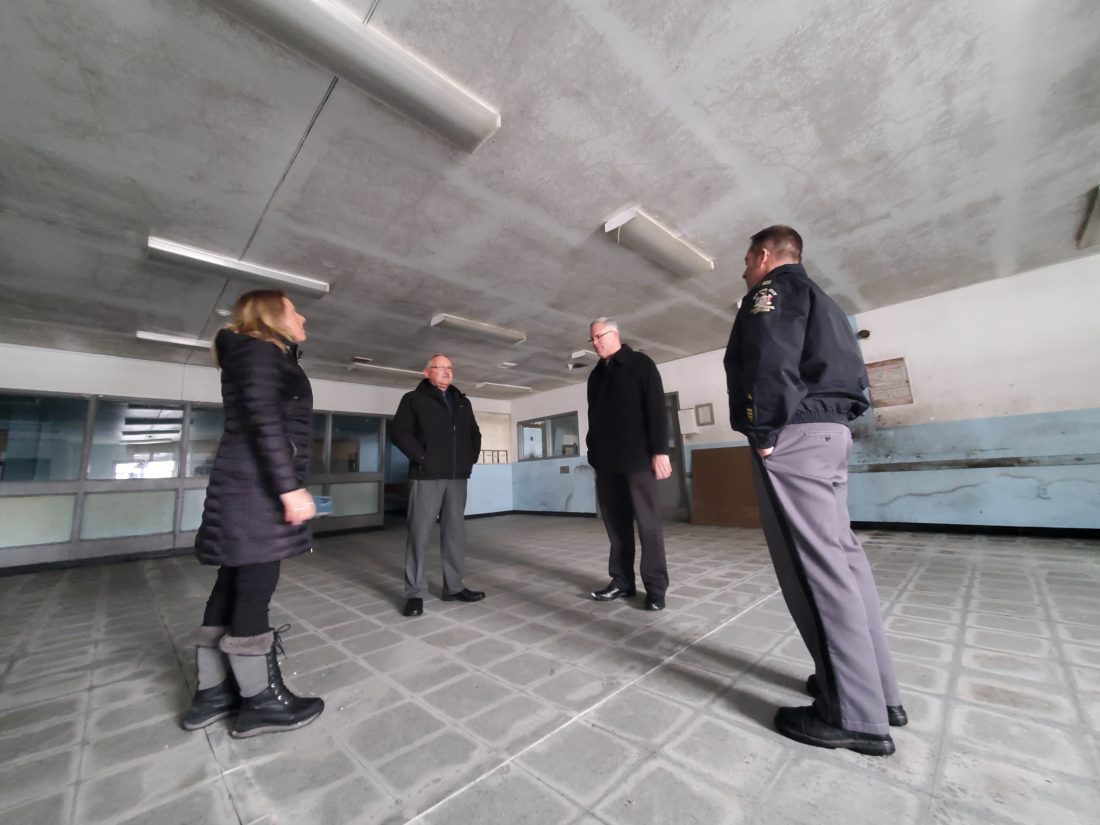Stec talks prison closures, reforms

From left, Franklin County Legislator Andrea Dumas, state Department of Corrections and Community Supervision Assistant Commissioner Steve Crozzoli, state Sen. Dan Stec, and DOCCS Captain Jay Skiff speak inside a building at the abandoned Camp Gabriels state prison in Gabriels last week. (Enterprise photo — Aaron Cerbone)
GABRIELS — When state Sen. Dan Stec toured the long-shuttered Camp Gabriels state prison last week, he had prison closures on his mind.
On Nov. 8, Gov. Kathy Hochul announced the closure of six more state prisons, including Ogdensburg Correctional Facility and Moriah Shock Incarceration Correctional Facility, a decision Stec, R-Queensbury, opposed.
Stec said the state does not have a good track record on putting closed prisons to use after they shut down — adding that Camp Gabriels, which has been empty since 2009, is a prime example of that.
The state says these six prison closures, which are slated to take place on March 10, 2022, are expected to save $142 million.
–
‘Times have changed’
–
Stec has a complex view of prisons. He believes criminal justice reforms are needed from time to time, but he’s often voted against the reforms proposed by Democratic legislators, who hold a majority in the state Legislature. He said these changes from progressives are too “soft on crime.”
Stec said perception of the state prison system depends on someone’s point of view.
“Is the system fair? Is the system racist? Is the system biased? It depends on where you sit,” he said. “In my limited exposure to it, (I) have confidence in it. But if I had a loved one in there, maybe I’d be a critic.”
Stec said he believes there are cases of abuse and mistreatment in state prisons. He said he’s heard the “horror stories.” But he doesn’t believe the whole system should change because of these cases. He believes most DOCCS workers are good people and that his Democratic colleagues are making their job harder.
“The pendulum has swung too far,” he said.
Stec agrees with limited criminal justice reforms.
“Not everyone with a joint in their pocket should be in prison,” he said. “Times have changed.”
But he also said the state has “turned its back” on crime. He believes the bail reform laws passed in 2020 disrespect law-abiding people and the victims of non-violent crimes.
New York’s prison population is around double what it was in the 1970s, when the state imprisoned between 10,000 and 20,000 people, according to data from the Prison Policy Initiative, a prison reform advocacy and research group. But the prison population is now only half as high as it was in the 1990s, when the state prison population peaked at around 73,000 individuals.
Today, including the impacts of recent criminal justice reforms and the coronavirus pandemic, there are around 32,000 people incarcerated in New York-run prisons.
Stec said when prisons are operating at a fraction of their maximum capacity, the numbers make it make sense to close them. But he also said these prisons create jobs that are needed in the North Country. He said in the 20th Century, when the state wanted to build more prisons, the North Country raised its hand and took the prisons with all the good and bad they bring.
–
Moriah Shock
–
Shock programs allow inmates with less than three years left on non-violent sentences to reduce their time served by attending “boot camp prisons,” where they work and follow strict daily schedules.
Because of their non-violent crimes, inmates are allowed by the state to be sent out on work crews. Locally, a crew from Moriah Shock has been seen most visibly at Winter Carnival, helping build the Ice Palace in Saranac Lake.
Stec said the program in Moriah is special, created through a progressive mindset with a focus on reform over punishment.
If the state’s goal is to close prisons and put more money into drug and alcohol programs, “that’s what shock is,” he said. Stec said the shock program results in low rates of recidivism.
“Shock is small but effective,” he said.
But there are also critics of shock programs, who say they are abusive, akin to slave labor and not as effective at reducing recidivism as they promise.
Stec said Moriah Shock has been pulled off the chopping block before, in 2011, but he said it will be hard to do that again. In 2011, Moriah town Supervisor Tom Scozzafava, then-county board Chairman Randy Douglas and the late Wilmington town Supervisor Randy Preston banded together to lobby against the closure.
Stec said he understands why the state would look to close Moriah. With bail reform, fewer people qualify for shock, as fewer people are being incarcerated for low-level offenses.
People make mistakes, he said, and shock programs can keep them from doing worse. Traditional incarceration sometimes has the opposite effect, he added. Stec believes housing someone with “the wrong bunch” can draw them into gangs and teach them criminal trades instead of productive ones.
“Between discipline and scaring the hell out of them, you can straighten them out,” Stec said of shock.
There are two other shock facilities in New York — Lakeview Shock Incarceration and Willard Drug Treatment.
When asked if that means the state should close prisons elsewhere, Stec said he does not want to pick out other correctional facilities he’d close instead. But he did say he wants the state to reconsider closing Moriah Shock Incarceration Correctional Facility.




